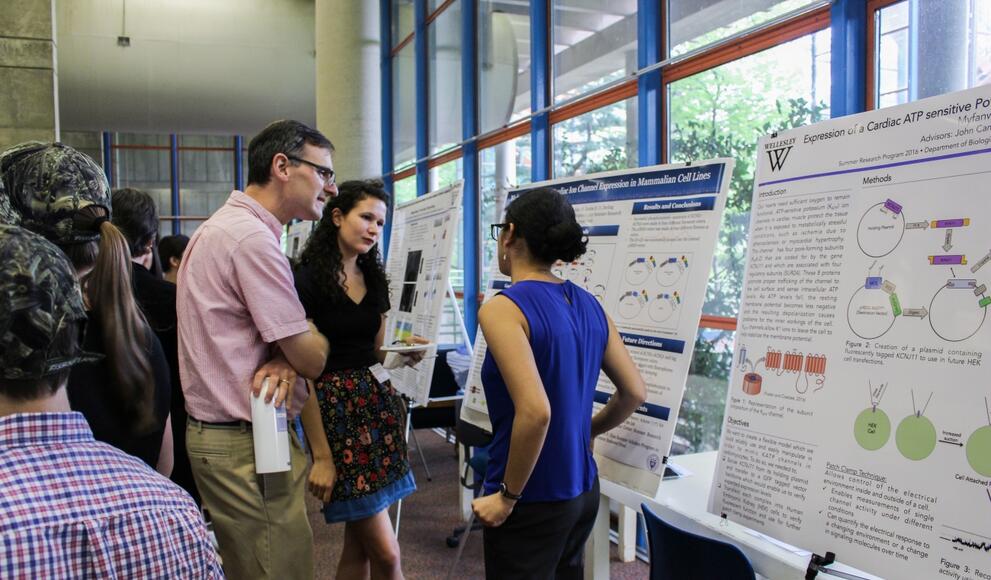Summer Poster Presentation and Keynote Address Celebrate the Strength of Wellesley’s Student Research

The Wellesley Summer Research Program gives students the opportunity to work on a variety of projects, fully funded, under the direction of College faculty. The program culminates in a poster session that highlights students’ research. On July 28, the Wellesley College Science Center welcomed students, faculty, and visitors for this year’s poster presentation.
"Students who participate in the research program consistently cite this experience as one of the highlights of their Wellesley careers," said Cathy Summa '83, director of Wellesley's Science Center. "This summer, we expanded the program and invited Dr. JudyAnn Bigby '73, former Massachusetts Secretary of Health and Human Services, to give a keynote address before the presentation. This better reflects what students experience at disciplinary conferences—they present their research and also have opportunities to attend talks that illustrate the relevance and importance of science in society that emerges from basic research."
President Paula Johnson welcomed students and praised their work, which she described as "extraordinary." Johnson noted that she had visited various labs earlier in the summer and was impressed by the teamwork among the students, the dedicated mentorship by the faculty, and by the fact that students were asking complex questions, developing hypotheses and devising experiments to test their hypotheses. She asked them to "Take this experience with you because it is an important one, as part of a liberal arts education and to your futures, whatever field you enter," she said.
Bigby, who serves on Wellesley's Board of Trustees, agreed with that statement. She also explained that her career path was shaped by her experience at Wellesley, where she researched the estrous cycle in rats for her senior thesis. "I quickly learned that I was allergic to rats, and therefore did not see myself having a career in the lab," said Bigby, who earned her MD at Harvard Medical School, where she decided to specialize in primary care and women’s health, which were not popular at the time.
When Bigby began practicing at Brigham and Women's Hospital, she focused on identifying factors that impeded women’s health in poor and underserved communities, and she worked with the hospital communities and the city of Boston to develop systems for vulnerable women. As Secretary, she implemented many aspects of the Massachusetts 2006 health care reform law, which contained several policies that improved women’s access to care. "I am sure that attending Wellesley opened the door for all the opportunities I’ve had," she said.
After Bigby's remarks, participants and visitors moved to the Science Center’s library for the poster presentation. More than 80 posters were on display and featured a wide range of projects by Wellesley students, as well as students from Framingham High School and the MIT/Wellesley Upward Bound Program.
Projects in the natural sciences included the impact of climate change on soil in the Northeast, the effects of nutritional stress on bumblebee foragers, and the role of progesterone receptors in regulating hormones. Other posters highlighted social science projects and crossover projects, on subjects such as leadership, incentives, and gender; economic growth and long-term technological change; and the efficacy of dual-language learning from the perspective of teachers.
Asriel Walker '19, a biochemistry major, worked with Megan Núñez, professor of chemistry, studying bacteria that could destroy harmful biofilm. The Summer Research Program gave her the opportunity to do hands-on research in an experimental lab, something she had long wanted to do. "I am so grateful for this experience because it will help me ultimately decide my future career path in science and medicine," said Walker, whose mother and sister drove up from Virginia to attend the poster session. Both noted, "Asriel has loved science since the third grade."
Catherine Nicoloff DS'19, a physics major, enjoyed telling people about her project, a prototype detector named :neta: that may help scientists gather sophisticated measurements about dark matter, which cannot be seen and is not yet clearly understood. Among those who stopped to ask questions about her project were a physicist from MIT and Lisa Basile,'01, who was visiting from MIT's Lincoln Lab.
Nicoloff, who worked under the direction of James Battat, associate professor of physics, was pleased to see student research receiving enthusiastic attention. "In our group alone, Casey Melton '19 discovered an exoplanet, Haimei Zhang '19 investigated quantum bits, and I worked on developing a new particle detector. That’s not an exhaustive list of worthy projects, by any means. It's just to illustrate that the Summer Science students at Wellesley are not only learning to do scientific research, their research is adding useful data to humanity’s collective store of knowledge."
Susan Windham-Bannister '72, who spearheaded $700 million of public investment in life sciences research, entrepreneurship and biomanufacturing as the founding president and CEO of the Massachusetts Life Sciences Center, concurs. She worked with Wellesley to identify and invite representatives from area life-science and high-tech companies to the poster session. More than a dozen firms were represented.
"We need to make Wellesley more visible to, and active in, Massachusetts’ life sciences community, which is the strongest in the world," Windham-Bannister said. "Not only has Wellesley long trained women to be leaders in the sciences, but the next big breakthrough in cancer or diseases of the central nervous system research—such as Parkinson's, Alzheimer's, multiple sclerosis—could come from excellent research being done by faculty and students on this campus."
